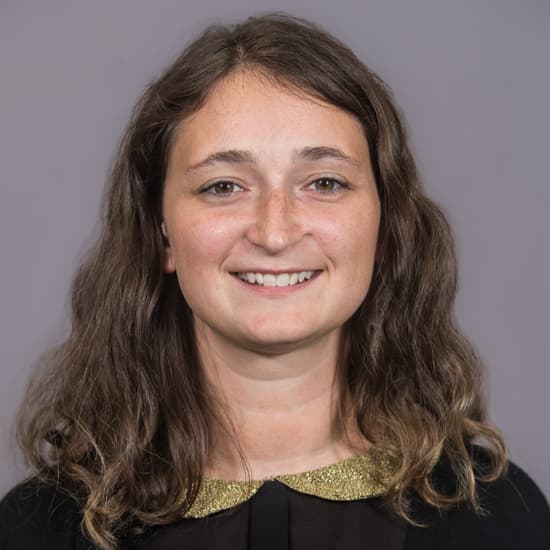Ph.D. Zoology, Oregon State University, 2016
M.S. Marine Biology, UNC Wilmington, 2010
B.S. Marine Biology, UNC Wilmington, 2007
Sheila Kitchen
Assistant Professor
Department of Marine Biology

"In the end we will conserve only what we love; we will love only what we understand; and we will understand only what we are taught."
– Baba Dioum, 1968
Learn more about Sheila Kitchen
- Get To Know
Sheila Kitchen
What in your life drew you to your current field of study?
Taking an inverts lab during the same semester as a marine mammalogy lecture did it for me. Being able to see and manipulate live specimens in the lab was more exhilarating than watching documentary footage of whale migrations (those are pretty cool too!). Now, I get to play with squishy, small organisms in the lab all the time.
What do you hope your students gain from studying or working with you?
To trust your gut and follow your curiosities. Students in my lab will come away with a foundation in molecular biology, bioinformatics and conservation along with some occasional fieldwork. My hope is that they can engage in real world issues while developing transferable research skills that will serve them in their future careers.
What are you passionate about in your personal life?
I enjoy spending time with my two cats, Elle and Ebisu, and my partner. Outside the lab you can find me kayaking, crafting (crocheting and painting), singing at the karaoke bar, or binging terrible TV shows.
- Education
- Courses Taught
MARB 689: Molecular Ecology Analysis (Fall, Graduate Level)
MARB 489: Coral Reef Biology (Spring) - Publications
Kitchen, S.A., D. Jiang, S. Harii, N. Satoh, V.M. Weis, and C. Shinzato. (2022) Coral larvae suppress the heat stress response during the onset of symbiosis thereby decreasing their odds of survival. Molecular Ecology, 31(22):5813-5830.
Vasquez Kuntz, K.L., S.A. Kitchen, T.L. Conn, S.A. Vohsen, A.N. Chan, M.J.A. Vermeij, C. Page, K.L. Marhaver, I.B. Baums. (2022) Inheritance of somatic mutations by animal offspring. Science Advances, 8{35):eabn0707.
Kitchen, S.A., C.C. Osborne, N.D. Fogarty and I.B. Baums. (2022) Morphotype is not linked to mitochondrial haplogroups of Caribbean acroporid hybrids. Coral Reefs, 41: 829–836.
Brückner, A., J.M. Badroos, R.W. Learsch, M. Yousefelahiyeh, S.A. Kitchen, and J. Parker. (2021) Evolutionary assembly of cooperating cell types in a multi-compound chemical defense system. Cell, 184(25): 6138-6156.e28
Reich, H.G., S.A. Kitchen, K.H. Stankiewicz, M.K. Devlin-Durante, N.D. Fogarty, and I.B. Baums. (2021) Genomic variation of an endosymbiotic dinoflagellate (Symbiodinium ‘fitti’) among closely related coral hosts. Molecular Ecology, 30: 3500-3514.
Kitchen, S.A., G. Von Kuster, K.L. Vasquez Kuntz, H.G. Reich, W. Miller, S. Griffin, N.D. Fogarty and I.B. Baums. (2020) STAGdb: a 30K SNP genotyping array and Science Gateway for Acropora corals and their dinoflagellate symbionts. Scientific Reports, 10: 12488.
Kitchen, S.A., A. Ratan, O.C. Bedoya-Renia, R. Burhans, N.D. Fogarty, W. Miller, and I.B. Baums. (2019) Genomic variants among threatened Acropora corals. G3: Genes|Genomes|Genetics, 9(5): 1633-1646.
Kitchen, S.A., A.Z. Poole, and V.M. Weis. (2017) Sphingolipid metabolism of a sea anemone is altered by the presence of dinoflagellate symbionts. The Biological Bulletin, 233(3): 242-254.
Kitchen, S.A. and V.M. Weis. (2017) The sphingosine rheostat is involved in the cnidarian heat stress response but not necessarily in bleaching. Journal of Experimental Biology, 220: 1709-1720.
Kitchen, S.A., C.M. Crowder, A.Z. Poole, V.M. Weis, and E. Meyer. (2015) De novo assembly and characterization of four Anthozoan (phylum Cnidaria) transcriptomes. G3: Genes|Genomes|Genetics, 5(11): 2441-2452.
Contact Info
Sheila Kitchen
Assistant Professor
Department of Marine Biology
kitchens@tamug.edu
Phone: +1 (409) 740-4454
Fax: +1 (409) 740-5001
Ocean & Coastal Studies Bldg., Office 259
Website
CV
Google Scholars Page